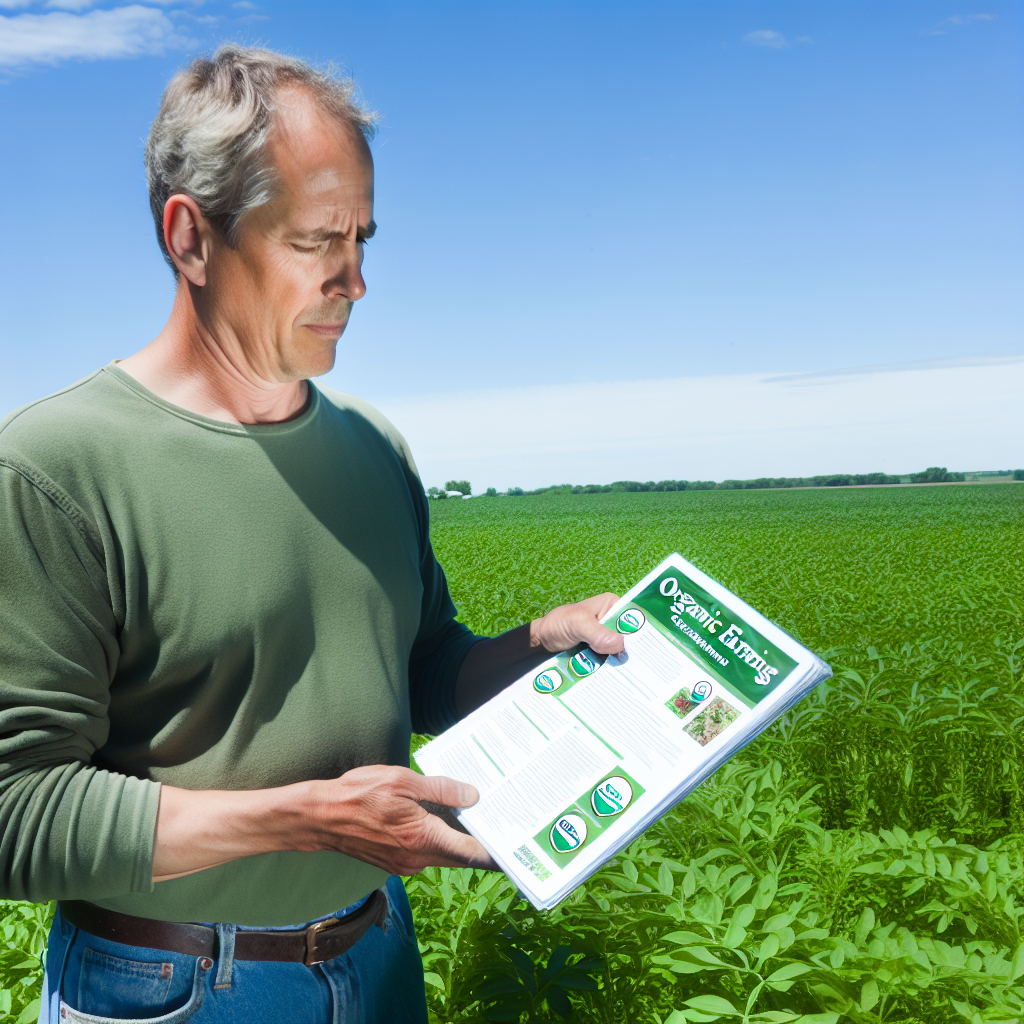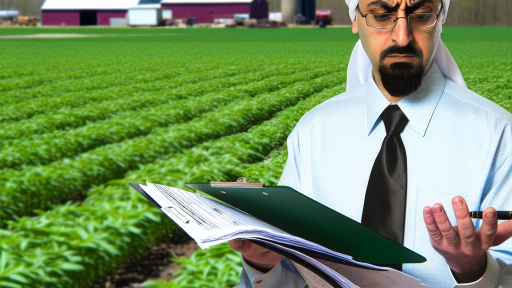Understanding Organic Farming Standards
Definition of Organic Farming Standards
Organic farming standards refer to regulations governing organic agriculture.
These standards ensure the integrity of organic products in the market.
They cover techniques, inputs, and overall practices used in farming.
Furthermore, they promote environmentally friendly agricultural methods.
Importance of Organic Farming Standards
Organic farming standards are crucial for consumer trust.
They provide assurance that products are genuinely organic.
This transparency enhances consumer confidence in their food choices.
Additionally, the standards support sustainable agricultural practices.
Environmental Benefits
One significant benefit is the protection of ecosystems.
Organic farming minimizes the use of harmful chemicals.
This approach fosters biodiversity and soil health.
In turn, it helps preserve water quality and supports wildlife.
Market Growth and Economic Impact
Organic farming standards play a vital role in market growth.
The demand for organic produce continues to rise globally.
These standards facilitate international trade and access to new markets.
Transform Your Agribusiness
Unlock your farm's potential with expert advice tailored to your needs. Get actionable steps that drive real results.
Get StartedMoreover, they create economic opportunities for farmers.
Challenges in Compliance
Despite their benefits, adhering to these standards can be challenging.
Farmers may face difficulties in transitioning from conventional practices.
Compliance requires ongoing education and investment in resources.
However, the long-term advantages often outweigh these initial hurdles.
Historical Development of Organic Farming Standards
Early Practices and Foundations
Organic farming has roots that date back centuries.
Agricultural practices were initially based on natural methods.
Farmers used crop rotation and natural fertilizers for sustainability.
These methods were deeply intertwined with traditional knowledge.
The Organic Movement Emerges
The early 20th century saw the rise of the organic movement.
Key figures, such as Sir Albert Howard, promoted organic principles.
They emphasized soil health as central to farming success.
In the 1940s and 1950s, organic farming gained momentum in the West.
Formation of Standards and Associations
By the 1970s, various organizations began establishing organic standards.
The USDA initiated organic agriculture programs in the United States.
Organizations like the Organic Trade Association emerged during this period.
These institutions aimed to unify and promote organic farming practices.
The Development of Certification Systems
The 1980s saw significant advancements in organic certification.
Certification systems provided guidelines for organic practices.
They helped assure consumers of the integrity of organic products.
In 1990, the Organic Foods Production Act established a national standard.
Modern Regulations and Global Standards
Today, organic farming standards vary by country.
International organizations work towards harmonizing these standards.
The World Trade Organization influences organic farming policies globally.
Showcase Your Farming Business
Publish your professional farming services profile on our blog for a one-time fee of $200 and reach a dedicated audience of farmers and agribusiness owners.
Publish Your ProfileIn recent years, consumer demand has further shaped regulations.
Continuing Evolution and Future Trends
Organic farming standards continue to evolve with research and innovation.
Technological advances enhance methods and practices in organic farming.
Farmers now adopt new techniques for sustainability and productivity.
Future trends will likely focus on climate resilience and biodiversity.
Key Organizations Regulating Organic Farming Standards
United States Department of Agriculture (USDA)
The USDA sets national standards for organic agricultural products.
It oversees the National Organic Program (NOP) that regulates organic labeling.
Through its certification program, the USDA monitors organic farms to ensure compliance.
European Union (EU) Organic Certification
The EU has strict regulations governing organic farming practices.
The European Commission is central to establishing and enforcing these standards.
Organic products must meet specific criteria for labeling and marketing in the EU.
National Organic Standards Board (NOSB)
The NOSB advises the USDA on organic regulations and standards.
It comprises farmers, consumers, and environmentalists to represent diverse perspectives.
This board plays a crucial role in shaping organic policy and practices.
International Federation of Organic Agriculture Movements (IFOAM)
IFOAM promotes organic agriculture worldwide through various initiatives.
It sets global standards for organic farming and certification processes.
Additionally, IFOAM supports organic farmers and advocates for sustainable practices.
Role of Private Certification Organizations
Numerous private organizations offer organic certification services.
These entities vary by region and often have specific standards for certification.
Examples include Oregon Tilth and California Certified Organic Farmers.
Importance of Compliance and Certification
Compliance with organic standards is essential for market access.
Certification ensures consumer trust in organic labeling and products.
Moreover, it helps maintain integrity within the organic farming community.
Find Out More: Compliance Tips for Farm Labor Laws
Major Components of Organic Farming Standards
Soil Quality
Organic farming prioritizes maintaining and improving soil health.
This includes using natural fertilizers like compost and manure.
Farmers avoid synthetic fertilizers that can degrade soil quality.
Crop rotation supports soil nutrient replenishment.
Cover crops enhance soil structure and prevent erosion.
Pest and Disease Management
Effective pest management is essential in organic farming.
Farmers utilize biological control methods rather than chemicals.
This involves introducing beneficial insects like ladybugs.
Crop diversity can also deter pests and diseases.
Regular monitoring helps farmers manage potential outbreaks proactively.
Genetic Modification
Organic standards strictly prohibit genetically modified organisms (GMOs).
This ensures that crops maintain their natural genetic identity.
Farmers must use traditional breeding methods for plant development.
Maintaining biodiversity is a key component of organic farming.
Animal Welfare
Animal welfare practices are integral to organic farming standards.
Animals must have access to outdoor spaces for natural behaviors.
Showcase Your Farming Business
Publish your professional farming services profile on our blog for a one-time fee of $200 and reach a dedicated audience of farmers and agribusiness owners.
Publish Your ProfileOrganic standards require a diet free from synthetic additives.
Farmers must provide humane living conditions for their livestock.
Regular health checks and veterinary care are mandated.
Certification Process
The organic certification process ensures compliance with standards.
This process includes thorough inspections by accredited certifying agencies.
Farmers must document their practices to demonstrate adherence.
Certification is typically renewed annually, requiring ongoing compliance.
Failing to maintain standards can lead to loss of certification.
Explore Further: The Role of Trade Agreements in Farming Success
Differences Between Organic and Conventional Farming Practices
Philosophy and Approach
Organic farming emphasizes working with nature, not against it.
This method prioritizes sustainability and ecological balance.
Conversely, conventional farming focuses on maximizing yields, often through chemical inputs.
Farmers in conventional systems might prioritize short-term gains.
Organic practices typically require a long-term perspective.
Use of Chemicals
Organic farming prohibits synthetic pesticides and fertilizers.
Instead, it relies on natural alternatives to manage pests and soil health.
Conventional farming often utilizes chemical pesticides to control infestations.
Many conventional farmers might apply fertilizers to enhance crop growth.
Crop Diversity and Rotation
Organic agriculture promotes crop rotation and diversity.
These practices help prevent soil depletion and pest build-up.
In contrast, conventional farming may rely on monoculture practices.
Monoculture can lead to increased vulnerability to pests and diseases.
Soil Management
Soil health is a cornerstone of organic farming.
Organic practices enhance soil biodiversity and structure.
Conventional methods may prioritize quick solutions for soil fertility.
Chemical fertilizers can degrade soil health over time.
Animal Welfare
Organic standards often require higher animal welfare conditions.
Animals raised in organic systems usually have access to outdoors.
Conventional farming can involve confined animal feeding operations.
These operations might not prioritize the well-being of the animals.
Certification and Standards
Organic farming requires adherence to strict certification standards.
Farmers must maintain transparent practices and documentation.
Conventional farming lacks a unified regulatory body for certification.
Farmers may follow personal preferences or regional guidelines.
Environmental Impact
Organic farming reduces chemical runoff and biodiversity loss.
This method promotes practices that enhance ecosystem health.
In contrast, conventional farming can lead to significant environmental degradation.
Runoff from chemical use can contaminate local water sources.
Find Out More: Overview of Agricultural Export Laws

Certification Process for Organic Farmers
Understanding Organic Certification
Organic certification verifies that farmers adhere to specific standards.
Showcase Your Farming Business
Publish your professional farming services profile on our blog for a one-time fee of $200 and reach a dedicated audience of farmers and agribusiness owners.
Publish Your ProfileThis process promotes sustainable farming practices.
Certification applies to various products, including crops and livestock.
Initial Steps for Certification
Farmers must begin by choosing an accredited certifying agency.
Next, they should complete an organic certification application.
It includes details about farming practices and crop history.
Then, farmers must prepare for an initial inspection.
Inspection Process
The certifying agency conducts a thorough inspection of the farm.
An inspector evaluates compliance with organic standards.
They review records, input use, and overall farm management.
If any issues arise, farmers must address them promptly.
Review and Decision
After the inspection, the agency reviews the findings.
A decision is made based on compliance with organic regulations.
If approved, farmers receive a certificate valid for a set period.
This certificate allows them to market their products as organic.
Maintaining Certification
Farmers need to renew their certification annually.
This process involves submitting updated information and fees.
Annual inspections are also part of the maintenance process.
Compliance with evolving standards ensures continued certification.
Benefits of Organic Certification
Certification opens new market opportunities for farmers.
It enhances consumer confidence in organic products.
Additionally, it contributes to environmental sustainability.
Organic practices promote healthy ecosystems and biodiversity.
See Related Content: Benefits of Trade Policies for Farmers
Challenges in Complying with Organic Farming Standards
Understanding the Standards
Organic farming standards vary by region and certifying bodies.
These regulations can be complex and sometimes confusing.
Farmers must stay updated on changes in these standards.
Financial Constraints
Complying with organic standards often requires significant investment.
For instance, transitioning land to organic can be costly.
Moreover, organic certification fees can add to financial burdens.
Knowledge Gaps
Many farmers lack access to information about organic practices.
Training programs and resources may not be easily available.
This knowledge gap can hinder effective compliance with the standards.
Environmental Conditions
Soil type and local climate affect organic farming practices.
Some regions may struggle to meet organic requirements due to these factors.
Consequently, crop yields might not align with organic principles.
Market Pressures
Organic products often face intense market competition.
Farmers must balance compliance with the demand for affordable products.
This pressure sometimes leads to compromised quality standards.
Time Commitment
Meeting organic farming standards demands extensive time and effort.
Farmers must carefully manage their practices and record-keeping.
Showcase Your Farming Business
Publish your professional farming services profile on our blog for a one-time fee of $200 and reach a dedicated audience of farmers and agribusiness owners.
Publish Your ProfileThis time commitment can strain resources and labor availability.
Benefits of Adhering to Organic Farming Standards for Farmers and Consumers
Improved Soil Health
Organic farming enhances soil health through natural practices.
This approach builds soil fertility over time.
Farmers benefit from improved crop yields.
Healthy soils support diverse microorganisms.
Environmental Protection
Adhering to organic standards reduces chemical runoff.
This practice protects local ecosystems and waterways.
Additionally, organic farming reduces pesticide use.
Farmers cultivate crops sustainably, promoting biodiversity.
Consumer Health Benefits
Organic foods often contain fewer harmful chemicals.
Consumers experience reduced exposure to pesticides.
Furthermore, organic produce is richer in nutrients.
This leads to better overall health for consumers.
Market Demand and Economic Advantage
Organic products are in high demand among consumers.
This demand translates into higher market prices for farmers.
Organic certification enhances market visibility.
Farmers can access specialized markets with better profit margins.
Community and Global Impact
Organic farming promotes local food systems.
It strengthens community ties by supporting local farmers.
This practice contributes to global efforts against climate change.
Farmers engage in sustainable practices that protect the planet.
Additional Resources
USDA Certified Organic: Understanding the Basics | Agricultural …
What is the Farm Bill? – National Sustainable Agriculture Coalition




